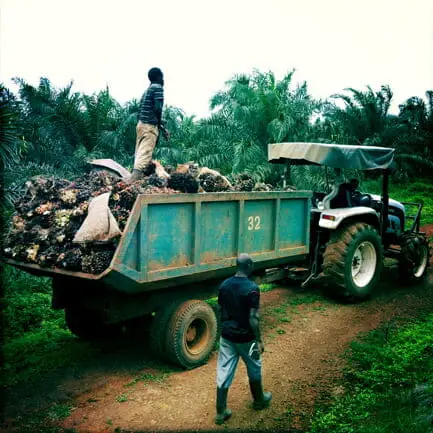
I have been following this sad case of Bidco and as I keep investigating them, I have realised that I am not the only one complaining . Hundreds of people are complaining and demanding that something is done . It is alleged that BIDCO worked with government officials to Grab Land from Poor Ugandan farmers .
Right now, the media and other people have been paid to fight me and Rubbish my claims . What we want from BIDCO is a serious response . they must clear their name .
This is a POST that was made in 2011 in The Source Project . Org Site . Read it
3oth October 2011
While in Kalangala, Uganda, Jason and I met Jim Jem, a quirky old farmer and a counselor – a man who is actively trying to create awareness in the community and protect his ancient forested land. One day I asked him to take me to the palm plantation. I wanted to meet some of the workers and hear their stories. Jim Jem initially agreed but then was reluctant and scared to take me into the plantation as he feared that we would ‘get caught’ or ‘may be even arrested’ for trespassing and tying to find out the truth about the condition of workers, who are virtually enslaved on these plantations. After much deliberation, we managed to set off on a motorbike along the dusty roads of Kalangala on a search for the workers of the palm plantations.
Kalangala is one of those many places all over the world that are losing not only their rich bio-diverse environments but also a sustainable way of life and culture, and all this in the name of development. The greed of the international corporations facilitated by local governments is taking away people’s rights to land, food and a sustainable way of life.
A Kenyan-Malaysian palm oil company has been clearing the ancient tropical forests on some of the islands in Kalangala district in Lake Victoria to grow palm. When it arrived on the island, the company promised creation of new jobs along with roads, hospitals and other facilities. There are no roads or hospitals and the plantation workers’ stories tell the truth about the jobs on offer.
I visited a settlement to meet some of the workers. It was row upon row of makeshift huts roughly of 1.5 by 2 m built out of bits of wood, plastic and tin. It is a very basic form of existence, there is nothing else in the hut apart from a mat or if the worker is better off, a bed and tools for work.
Magoma Muhamad is 39, he came to Kalangala in 2007, leaving behind 6 children and a wife. He has not managed to collect enough money to go back home since. He comes from Mbale district in Eastern Uganda. Most workers on the plantation, like him, come from eastern or northern Uganda – the poorest areas of the country, tormented by political unrest, lacking infrastructure and suffering due to corrupt governance. There is massive economic migration from these regions to the capital as well as to other parts of Uganda. The workers are lured into working at the plantation; having no choices in their hometowns, they accept the jobs and hope that somehow they will be able to work and save enough money to send home to their families.
Magoma was promised 2200 Ugandan shillings (80 $ cents) per day, which would earn him roughly 20 US $/month. But when he started working he realized that out of his salary, he would not be able to save anything at the end of the month. What he hadn’t realised at the time of accepting the work, was that he was expected to pay the company, not only for his food and accommodation but also for the tools he needed to carry out his job.
The workers pay around 16000 shillings (6 US $) per month to the company for supplying them with basic foods, this includes 5 kg maize and 1 kg of beans. This food however is never enough, so many of the plantation workers go to the forests or surrounding fields to look for other sources of food, including field mushrooms, leaf spinach and grubs. Anything and everything is utilised .
Workers told me that as well as having money deducted for their accommodation and food, the company also deducted money for their tools. Each worker is supplied with gumboots, a metal hook, cutting tool and a machete. For these, the company charges them a monthly rent, and once this final deduction and a so called national social security is taken, the average worker is left with almost nothing, and in some cases we were told that at the end of the month, people owed the company money. Figures tended to vary a little but below is a list of deductions made by the company every month:
– gumboots 12,500 shillings (5 US $),
– hook for harvesting 6000 shillings (2.5 US $),
– hoi for digging 8000 shillings (3 US $),
– panga (a machete like tool) for harvesting 6000 shillings (2.5 US $),
– wheelbarrow for carrying the fruit 83,000 shillings (32 US $) (with a wheelbarrow we were told, the average plantation worker can earn many times his normal wage, however, once the company has deducted the rent, there is often little difference.)
Effectively the workers end up paying most of the salary back to the company. An average worker barely manages to earn less than 50 $ cents/ day. A true demonstration of the level of exploitation a company can do in the pursuit of profit maximization. Most workers are paid in cash and work as daily labourers, having no way of demanding for their minimum expected wages.
Many workers like Magoma talked about the exploitation of NSSF (National Social Security Fund). The company deducts a monthly amount informing the workers that when they leave the company, this money – a lump sum – will be paid to them. We were told that this never happens, they say the money just disappears and they have no way of recovering it. Magoma kept showing me his wage slips and asking me, ‘why I don’t know where my hard earned money is’
The workers, mostly uneducated and lacking means to pursue their money eventually stop trying to recover their NSSF money. Many that I met in Kalangala claimed that the company had taken their money and never put it in the scheme in the first place, ‘so they robbed us.’
The workers start at 7 and work till 2 or 6 o’clock. The work involves planting, spraying, harvesting of the palm fruit, which is all done manually and requires a certain level of physical strength, thus the plantations are mainly dominated by male workers. The female workers tend to work on collecting the leftover fruit pieces.
Massa Ziadi is 25 and has 4 children. He recently injured his hand while harvesting palm and is now not able to work. He has no insurance and the company is not paying for his treatment. He has stopped earning money and this has direct effect not only on his health but also on the health of his wife and children. Many workers like Massa, vulnerable and in distress turn to stealing food or burning wood for charcoal to get by and risk getting arrested.
The cheap and plentiful labour and resources of the countries of the global south are being exploited by the corporations to produce commodities like biofuel. These are supported by the governments of the west proclaiming them as ‘economic salvation for the poor countries’, while the only economic salvation they provide is to corporations and corrupt governments. The masses are not benefiting, but only suffering due to environmental and social loss.
If this is the future for development, then what is the future of the young generation growing up in Uganda now?
We need to understand the realities of the development that the organisations like the World Bank and the UN are promoting. It doesn’t seem to be working for the people that it’s supposed to help. The question remains whom the development is for then. Land grabbing and economic slavery has been re-packaged as positive economic policy for development, it is a complete lie and the sooner we begin to realise it the sooner we can fix our escalating problems.












































































